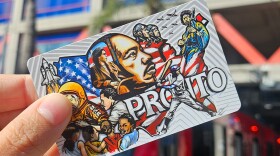RENEE MONTAGNE, host:
We turn, now, to how Europe's largest economy is trying to extricate itself from a deep recession. Germany has found some relief in one of its main stimulus measures - big cash bonuses to people who trade in their older cars for new, fuel-efficient ones.
This environmental bonus of more than $3,000 has dramatically boosted sales of small cars, but it's also got critics, who aren't impressed. From Berlin, NPR's Eric Westervelt reports.
(Soundbite of music)
ERIC WESTERVELT: The smooth jazz elevator music washes over the cavernous and gleaming Toyota dealership in central Berlin. Salesman Nicholas Hausvald(ph) wears an air of confidence, along with his pink shirt and matching green and pink tie. And why shouldn't he have a spring in his step? After a horrible 2008, business is up significantly. He says customers from all walks of life are now walking through his door.
Mr. NICHOLAS HAUSVALD (Salesman, Toyota): You have your, you know, bike-riding hippies. You have your real estate agents. Families in the making, that have a baby on the way. You have bankers.
WESTERVELT: And sometimes Hungarian economists living in Germany. Salesman Hausvald smiles as he shakes hands and seals a sale with Dr. Farenz Grossman(ph).
Mr. HAUSVALD: Yeah? (Unintelligible)
WESTERVELT: Grossman says he was thinking about a new car anyway, but the bonus clenched it. He's just bought a new Toyota Urban Cruiser. The economist says he's like to see the state do more to help the less well off. But the ailing German economy has to be rebooted somehow, he says, so why not try with car sales.
Mr. FARENZ GROSSMAN (Economist): (Through translator) This bonus acts as a kind of first aid or oxygen mask. We hope this extra boost of oxygen will start to breathe new life into the entire economy.
WESTERVELT: Car sales in Germany were up 40 percent in March from the same month last year. More than 1.2 million people have applied for the $3,300 bonus so far. And the government recently added another $4.6 billion to the program to keep it going through the end of the year. But the program's many critics say it's the economic equivalent of a sugar rush, short term and hardly the financial sustenance needed to lift the German economy.
While the bonus has boosted sales of small carmakers, including Germany's VW, it has mainly helped foreign companies. The program's done almost nothing to help the big German automakers, BMW and its rival Daimler, maker of Mercedes. Those companies drive Germany's auto industry and employ tens of thousands. Both companies again posted losses last week, Daimler is threatening layoffs.
Dr. Martin Holtz(ph) is an auto industry analyst with Deloit(ph) Germany. He says the bonus program is essential in the short term, but he warns car sales could tank next year.
Dr. MARTIN HOLTZ (Analyst, auto industry): When this bonus program will be finished, it will become quite hard for those companies who benefit right now from this program, to keep their markets stable within the next two or three years.
WESTERVELT: Others say the environmental bonus is grossly misnamed. Garret Latseepen(ph) with the German Association for Sustainable Mobility says the program is prompting people to unnecessarily scrap perfectly good and reasonably fuel efficient cars. He says it should really be called the Angela Merkel election bonus, noting the German chancellor is in for a tough reelection fight this September.
Mr. GARRET LATSEEPEN (German Association for Sustainable Mobility): This bonus is an election year gimmick, a publicity stunt. It will do little for the environment. And after the election the taxpayers will have to foot the bill.
WESTERVELT: In a sales lot outside the Toyota dealership, Berlin sportswear designer Rudolph Frankler(ph) is looking at a small fuel efficient Toyota. He says he's thinking about getting one. Then he looks at all the commuters stuck in traffic and has second thoughts.
Mr. RUDOLPH FRANKLER: It's crazy. So many. Look, one person, one person at the wheel - here in the car. And how many liter of gasoline are going in the air? I have my bike.
WESTERVELT: Frankler chuckles, then climbs onto his bicycle and says, for now, he'll continue to rely on the city's excellent system of subways, trains, buses and his own pedal power.
Eric Westervelt, NPR News, Berlin. Transcript provided by NPR, Copyright NPR.






